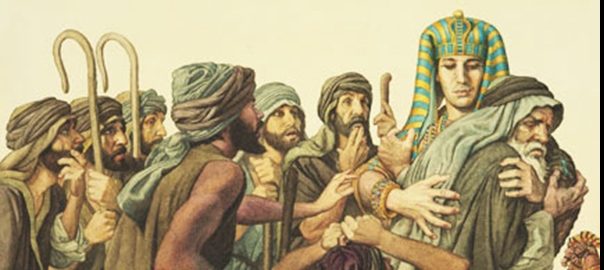Telephone Torah Study: When Dreams Come True

In this week’s Torah portion— Mikeitz (Genesis 41:1-44:17)—Joseph interprets Pharaoh’s dreams and rises to power, his brothers journey to Egypt for food and the brothers appear before Joseph who hides his identity to them.
Telephone Torah Study – this Thursday, 4-5pm. To join in on the conference call, please dial 702-851-4044, when prompted punch in 2, then our pass code 22252#.
Suggested Reading
Union of Reform Judaism (URJ) weekly Torah commentary, David Segal’s ‘Earning Forgiveness.’
A pious and beloved but poorly dressed Chasidic rebbe took a lengthy train ride to teach Torah in a town far away. The well-to-do passenger seated next to him subjected him to insult and verbal abuse for most of the ride. When the train finally reached its destination, the rebbe was greeted at the station by thousands of excited disciples, anxious to learn at his feet. The disrespectful passenger looked mortified as he saw the scene unfold. “I’m so ashamed,” he said. “I had no idea who you were. Please accept my apologies.” The rebbe turned to him and said, “Don’t apologize to me. Apologize to the anonymous nobody you sat next to on the train. When you insulted me, you did so because in your eyes, I was a nobody.”
(Chasidic tale, adapted from Erica Brown’s retelling)
In this week’s parashah, the sons of Jacob travel to Egypt during the famine to obtain food from Joseph, the estranged brother they no longer recognize. Joseph maintains his anonymity in order to test his brothers. Have they changed since they betrayed him more than two decades earlier? Have they learned how to act like brothers who take care of each other, or do old rivalries and jealousies hold sway? If he reveals himself too soon, his brothers might feign remorse in order to win his favor.
When the brothers arrive in Egypt, Joseph “recognized them, but he pretended to be a stranger to them and spoke roughly to them” (Genesis 42:7). One could surely forgive Joseph for dealing harshly with his brothers out of vengeance for abusing him, but revenge is not on his mind. He wants to know whether his brothers regret how they treated him. (As students in my Torah study group asked, why for twenty years did Joseph never send word to his family that he was still alive? Perhaps anonymity is key: if his brothers saw how powerful and important he was now, it would be impossible for him to know their genuine feelings about him.)
So Joseph devises several tests for his brothers. First, he insists on treating them as spies until they send someone home to Canaan to bring their youngest brother to Egypt. Such an act would require defying their father’s wishes, since Jacob fears lest “a deadly mishap befall him [Benjamin]” (Genesis 42:4). Joseph lets them stew for three days and then makes a different offer: one brother shall remain confined in Egypt while the rest return home with food and then come back to Egypt with their youngest brother. Joseph wants to know if they are “honest men” (Genesis 42:19), which in itself would show profound moral growth from the fratricidal betrayers they had been in their youth.
Continue reading in Reform Judaism
Torah Passage of the Week
Pharaoh said to Joseph, “I dreamt a dream and there is no one to interpret it; but I have heard this about you; you have but to hear a dream to interpret it.” Joseph answered Pharaoh by saying, “Not I—it is God who will account for Pharaoh’s well-being.” (Gen. 41:15-16)




